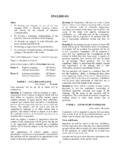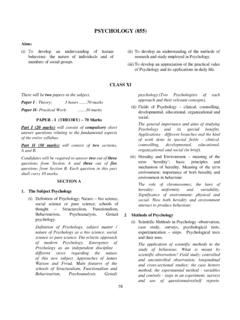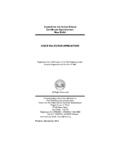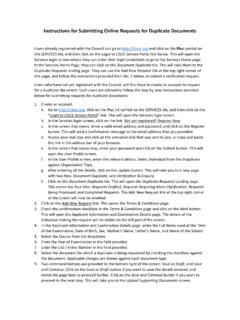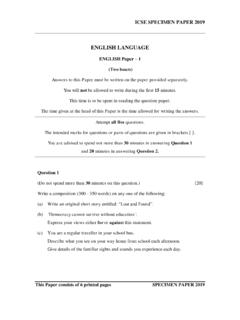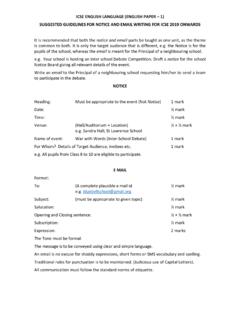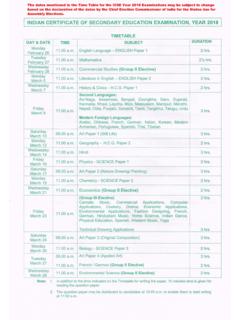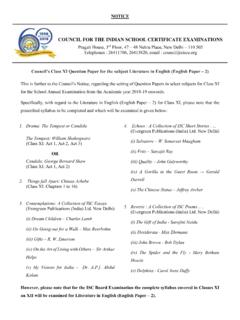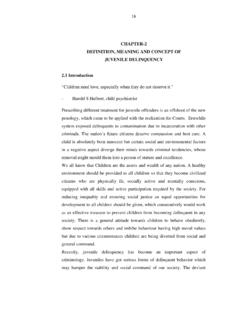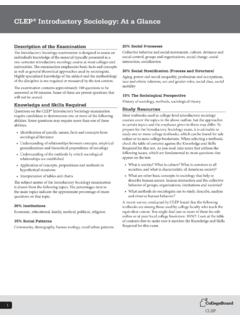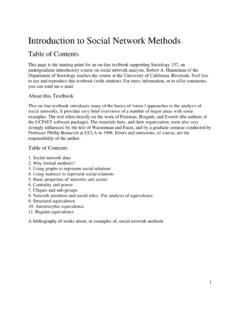Transcription of POLITICAL SCIENCE (852) - CISCE
1 30 POLITICAL SCIENCE (852) Aims: 1. To enable candidates to acquire knowledge (including information of facts, terms , concepts, conventions, principles, generalisation, assumption, hypothesis) concerning POLITICAL SCIENCE . 2. To enable candidates to apply acquired knowledge and understanding of procedures and the practices of governance in unfamiliar situations. 3. To develop an understanding of meanings and implications of the aforesaid items. 4. To develop an interest in the problems related to the structure of governments and POLITICAL life of the people of one's country and those of the world. 5. To develop positive attitudes necessary for developing a broader outlook. CLASS XI There will be one paper of three hours duration of 100 marks divided into two parts.
2 Part I (30 marks) will consist of compulsory short answer questions, testing knowledge, application and skills relating to elementary/ fundamental aspects of the entire syllabus. Part II (70 marks) will be divided into two sections A & B. Candidates will be required to answer three questions out of five from Section A and two questions out of three from Section B. Each question in this part shall carry 14 marks. SECTION A POLITICAL Theory 1. Fundamental Ideas Meaning of Politics; is Politics a SCIENCE ? Definition of POLITICAL SCIENCE ; difference between POLITICAL SCIENCE and Politics; relation of POLITICAL SCIENCE with other Social Sciences (History, Economics, Ethics and Sociology). Difference between State and Government, State and Society, State and Association, Nation, Nationality and Nationalism.
3 Meaning of Politics; is Politics a SCIENCE ? Definition of POLITICAL SCIENCE ; difference between POLITICAL SCIENCE and Politics; relation of POLITICAL SCIENCE with other Social Sciences (History, Economics, Ethics and Sociology). Difference between State and Government, Nation, Nationality and Nationalism. Definition of State and elements of the State: (a) People (b) Territory (c) Government (d) Sovereignty. State and Society: definition of Society; difference between the State and Society. Association: definition, difference between State and Association. Government: definition, difference between the Government and the State. Nation, nationality and nationalism: meaning and definitions of these terms , their inter-relationship and difference.
4 Factors helpful in evolution of a nation: common race and kinship, community, religion, language. Geographical contiguity and common economic ties, common history and traditions. Theory of one Nation and one State. Difference between the State and Nation. 2. The Origin of the State Divine Origin Theory; the Force Theory; the Genetic Theory; the Social Contract Theory (Hobbes, Locke, Rousseau); the Patriarchal Theory; the Matriarchal Theory; the Evolutionary Theory. Development of the State. Various theories of the origin of State: Divine theory, Force theory, the Genetic theory, the Social Contract theory, the Evolutionary theory.
5 Development of State: the Divine theory. Brief history of this theory, divine rights of the kings - example from modern monarchical states like England, Bhutan, Nepal, etc. Critical view. The Force theory - critical evaluation. The Genetic theory: The Patriarchal and Matriarchal theory - critical evaluation. The Social Contract theory: The basic views of Hobbes, Locke and Rousseau in a compact manner and the critical evaluation of the theory. Evolutionary Theory: factors for the growth of this - such as kinship, religion, economic factor, wars and conflicts and the need for POLITICAL power, conclusion. Development of the modern State through - tribal state, the oriental empire, the early city states, etc. 31 3. Modern Theories of the State Socialism; communism; syndicatism; guild socialism; fascism.
6 Definitions of all the "isms"; main exponents of all these theories, essentials of all "isms" value and criticism of these theories. 4. The Purpose of the State Divergent views: the state is an end in itself; the greatest happiness of the greatest number; modern view. Divergent views - the State is an end in itself. The greatest happiness of the greatest number. Modern view. Meaning of the purpose of the State - brief knowledge of the functions of the State. Views of individualists and socialists - regarding the main aim or the end of the State - modern practical view - the concept of the welfare State. Functions of the welfare State - references can be given about the social securities in the west and Directive Principles of State Policy in India.
7 5. Sovereignty Meaning, kinds and characteristics. Is sovereignty absolute and indivisible? A historical analysis. Meaning and kinds, characteristics. Is sovereignty absolute and indivisible? Meaning, definitions, characteristics such as all comprehensive, universal, permanent, inalienable, exclusive, etc. Kinds: titular and real, legal and POLITICAL ; De-jure and De-facto sovereign, popular sovereignty. Brief study of Austin Theory and Pluralistic view of Sovereignty. 6. Law Meaning and nature of law; sources of law; kinds of law. Meaning, definition of nature of law - different theories of law - analytical, historical, philosophical, comparative and sociological schools of thoughts of law - brief study. Sources - customs, usages, religion, judicial decisions, scientific commentaries, equity, legislation.
8 Kinds of law municipal, national, constitutional and international law, statute law, ordinances. 7. Liberty Meaning of liberty; kinds of liberty; civil liberty; POLITICAL liberty; safeguards of liberty. Does law help or hinder liberty? Definition - kinds of Liberty: natural, POLITICAL , economic and national liberty. Relationship between Liberty and Law. Conditions of Liberty as fundamental rights. Separation of judiciary from executive, well-knit party system, economic justice for all, free press and media, vigilance by the people. Safeguards of Liberty; does law help or hinder liberty? 8. Equality Meaning of equality; extent of equality in modern states; kinds of equality; equality and liberty. Meaning of Equality; extent of Equality; kinds of Equality; equality and liberty; definition; extent to which every one must get equality to realize the best; absence of special privileges.
9 Equality and Liberty - self-explanatory. 9. Citizenship Meaning and types of citizenship. Meaning and types of citizenship. Definition of a citizen. Difference between a citizen and alien. Definition of citizenship. Kinds of citizenship - natural and naturalized. Double citizenship with one loyalty towards the nation or country of birth. 10. Forms of Government Monarchy; aristocracy; democracy. Definitions of these governments. Kinds: Monarchy - constitutional or limited; absolute monarchy. Aristocracy - elected or hereditary. Democracy - direct and indirect. Merits and demerits of these governments. Conditions for successful working of democracy. SECTION B Modern Constitutions 11. India (i) Evolution of the Indian Constitution; formation of the Constituent Assembly of India; the Constitution of 1950 - basic features; the Union Government; the State Government; Legislature, Executive, Judiciary (composition only); relationship between Centre and State (legislative, administrative, financial).
10 Public Services; composition and powers of Union and State Public Service Commissions. Local Self Government. 32 Evolution of the Indian Constitution, formation of Constituent Assembly of India. The Constitution of 1950 - basic features. Relations between the Centre and the States. Composition of the Centre and the State governments - Legislature, Executive, Judiciary. Composition and powers of Union Public Service Commission and State Public Service Commission. Local self government. Formation of the Constituent Assembly of India under Cabinet Mission Plan in 1946. Implementation of the Constitution in 1950 - basic features. Composition of Rajya Sabha, Lok Sabha, State Legislative Assembly and Legislative Council.
